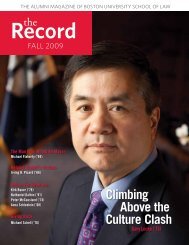the nature of representation: the cherokee right ... - Boston University
the nature of representation: the cherokee right ... - Boston University
the nature of representation: the cherokee right ... - Boston University
Create successful ePaper yourself
Turn your PDF publications into a flip-book with our unique Google optimized e-Paper software.
2005] THE NATURE OF REPRESENTATION 145<br />
Cherokees. The Cherokee delegate would simultaneously increase <strong>the</strong> Cherokee<br />
voice in Congress and reduce that <strong>of</strong> all o<strong>the</strong>r Americans. Cherokees would get to<br />
vote in <strong>the</strong> general elections, primarily to select Oklahoma representatives, and<br />
would also get to vote 273 for a Cherokee representative. With a Cherokee delegate,<br />
<strong>the</strong> Cherokees would, relative to o<strong>the</strong>r Americans, have a super-vote.<br />
The problem <strong>of</strong> <strong>the</strong> Cherokee super-vote must be confronted, for solutions<br />
seeking to equalize <strong>the</strong> power <strong>of</strong> Cherokee and non-Cherokee votes fail.<br />
Disallowing Cherokees <strong>the</strong> <strong>right</strong> to vote in <strong>the</strong> general election would prevent <strong>the</strong>m<br />
from having a super-vote, but doing so would disenfranchise Cherokees, denying<br />
<strong>the</strong>m <strong>the</strong>ir <strong>right</strong>s as American citizens. Alternatively, if Cherokees directly voted<br />
for <strong>the</strong> Cherokee delegate, <strong>the</strong>y could choose whe<strong>the</strong>r <strong>the</strong>y would vote in ei<strong>the</strong>r <strong>the</strong><br />
general or <strong>the</strong> Cherokee election. 274 But this would not solve <strong>the</strong> super-vote<br />
problem. Cherokees could shop for <strong>the</strong> election in which <strong>the</strong>ir vote would be most<br />
powerful by calculating <strong>the</strong> probabilities <strong>of</strong> <strong>the</strong>ir favorite candidates winning in both<br />
elections. The choice <strong>of</strong> which election to vote in allows Cherokees a <strong>right</strong> to a<br />
greater voice relative to non-Cherokees.<br />
Proposals for limiting <strong>the</strong> Cherokee super-vote by allowing Cherokees to vote<br />
only for a single candidate would create two problems. First, <strong>the</strong>y would ei<strong>the</strong>r<br />
limit Cherokee citizenship <strong>right</strong>s or fail to solve <strong>the</strong> super-vote problem. Second,<br />
<strong>the</strong>se proposals would deny Cherokees <strong>the</strong>ir <strong>right</strong>s under <strong>the</strong> Treaty <strong>of</strong> New Echota.<br />
Forcing Cherokees to vote only for <strong>the</strong> Cherokee delegate would serve to strip <strong>the</strong><br />
delegate <strong>right</strong> <strong>of</strong> part <strong>of</strong> its significance, denying <strong>the</strong> uniqueness <strong>of</strong> Cherokee<br />
removal and history. 275 Efforts to “solve” <strong>the</strong> super-vote problem require viewing<br />
<strong>the</strong> super-vote as a problem according to ei<strong>the</strong>r non-Cherokee perspectives or<br />
constitutional/legal claims. Since Cherokees have both Cherokee and American<br />
citizenship, <strong>the</strong> delegate <strong>right</strong> is meaningful only with a super-vote.<br />
In seeking a super-vote, Cherokees must confront <strong>the</strong> popular, and legal, belief<br />
epitomized in <strong>the</strong> saying, “one person, one vote.” While Lani Guinier once wrote,<br />
273 Their vote could be indirect if <strong>the</strong> Cherokee Nation decided that <strong>the</strong> Cherokee<br />
Principal Chief should select <strong>the</strong> delegate. Then Cherokees would be selecting <strong>the</strong>ir<br />
delegate through <strong>the</strong>ir votes for Cherokee Principal Chief. Or it could be direct if<br />
Cherokees directly voted for <strong>the</strong> delegate. However, <strong>the</strong> effect would be <strong>the</strong> same:<br />
Cherokees would get to vote for <strong>the</strong> “normal” delegate and <strong>the</strong> Cherokee delegate.<br />
274 Such a selection would be similar to <strong>the</strong> selection allowed for New Zealand’s<br />
indigenous group, <strong>the</strong> Maoris. “Maoris are given <strong>the</strong> option <strong>of</strong> registering on <strong>the</strong><br />
general roll or <strong>the</strong> Maori roll.” Mina Matlon, Fulfilling Obligations Under<br />
International Human Rights Law: Contemporary Indigenous Participation in<br />
Decision-Making Under Comparative Regimes, Project for Harvard Law School’s<br />
Indigenous Rights clinical (Spring 2002) (on file with <strong>the</strong> author and originally written<br />
to accompany <strong>the</strong> author’s research on <strong>the</strong> New Echota negotiations that became <strong>the</strong><br />
basis<strong>of</strong>thisarticle).<br />
275 The <strong>right</strong> would not be entirely insignificant because it would guarantee<br />
Cherokee <strong>representation</strong> and prevent <strong>the</strong> Cherokee vote from being diluted through an<br />
open election for a general delegate.









